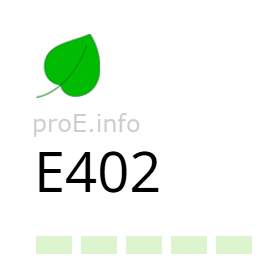
Other names for the additive (synonyms)
General Information
Potassium alginate (food additive E402) is a salt of alginic acid. It is a natural polysaccharide used in the food industry as a thickener, stabilizer, and gelling agent. It is applied to improve product texture, retain moisture, and form gels.
In nature, potassium alginate is found in the cell walls of brown algae (laminaria, fucus, macrocystis). For industrial production, algae are harvested in coastal areas of Japan, China, Chile, Norway, France, and the USA. The technology includes alginic acid extraction, neutralization with potassium salts, and subsequent drying.
From a chemical perspective, potassium alginate is a linear copolymer composed of residues of D-mannuronic and L-guluronic acids linked by β-1,4-glycosidic bonds. Its formula is expressed as (C6H7O6K)n.
In appearance, additive E402 is a light brown or cream-colored powder, readily soluble in water, forming viscous solutions. When interacting with calcium ions or other divalent metals, it forms strong gels.
Effects on the Body
Benefits of Additive E402
Salts of alginic acid, including potassium alginate, are known for their enterosorbent properties. They bind and remove radionuclides and heavy metals, reducing their toxic effects on the body. These properties were actively studied in the 1970s–1980s in the context of radiation contamination issues.
Research has shown that alginates can influence lipid metabolism. In animal and human experiments, a reduction in cholesterol levels, normalization of triglycerides, and a decrease in total fat mass were observed. The effect is explained by potassium alginate’s ability to form viscous gels in the intestine, reducing lipid absorption.
In clinical practice, potassium alginate is used in preparations for the treatment of gastrointestinal diseases. It helps reduce symptoms of gastroesophageal reflux disease (GERD) by creating a protective barrier on the surface of stomach contents and preventing acid reflux into the esophagus.
Due to its water-holding capacity, alginates help normalize stool and gently act as dietary fibers. In medicine, they are also used to accelerate wound and burn healing — alginate dressings effectively absorb exudate and stimulate tissue regeneration.
Risks of Additive E402
Overall, potassium alginate is considered a low-toxicity compound. In animal studies, even at very high doses (grams per kg of body weight), no serious disorders were observed. Side effects were limited to minor changes in liver biochemical markers (AST, ALT), which remained within the normal range.
In humans, unwanted effects are possible with excessive consumption of additive E402. In rare cases, it may cause a mild laxative effect, as well as reduced absorption of trace elements such as calcium, iron, and zinc. This is due to the high sorption activity of alginate, which binds ions in the intestine.
Some studies note that in patients with chronic gastrointestinal diseases (e.g., irritable bowel syndrome), excessive alginate intake may increase gas formation and cause discomfort. However, such cases are very rare and most often associated with exceeding the levels used in the food industry.
According to JECFA (FAO/WHO), alginates are recognized as safe at a consumption level of up to 50 mg/kg of body weight per day. EFSA, in its re-evaluation (2017), concluded that there is no need to establish a numerical ADI, as even at maximum use levels additive E402 poses no health risk.
Uses
Additive E402 is applied in various sectors of the food industry:
- as a thickener and stabilizer in sauces, ketchup, and mayonnaise;
- for gelling marmalade, candies, jams, and fruit fillings;
- in meat and fish products — to retain moisture and improve texture;
- in dairy desserts, ice cream, and yogurts — to stabilize structure;
- in bakery — to increase dough viscosity and slow down staling.
In pharmaceuticals and medicine, potassium alginate is used as a base for suspensions, ointments, and tablets, as well as for wound dressings. In cosmetics, it is used as a stabilizer in creams and lotions.
Legal Status
Food additive E402 is permitted for use in many countries worldwide. In the European Union, its use is regulated by Regulation (EC) No 1333/2008, where it is included in the list of approved additives. The European Food Safety Authority (EFSA) in 2017 confirmed the safety of sodium alginate.
In the USA, the Food and Drug Administration (FDA) classifies potassium alginate as a GRAS substance (Generally Recognized As Safe). JECFA has set an acceptable daily intake (ADI) at 50 mg/kg of body weight. In Canada, Japan, Ukraine, and CIS countries, additive E402 is also officially permitted.